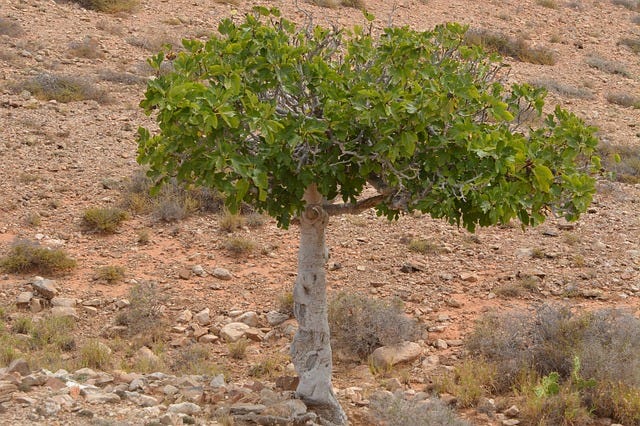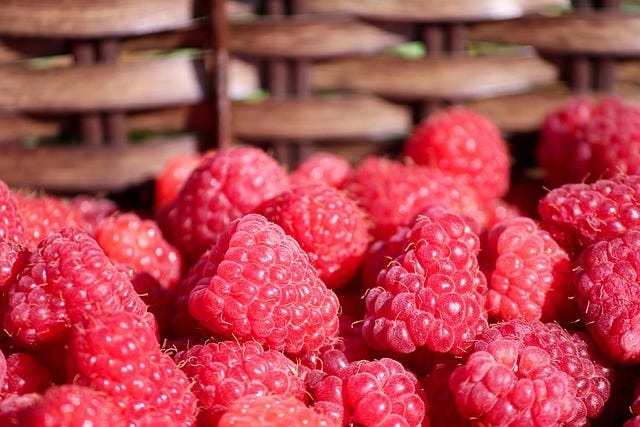Spring brings about the hope of fresh growth in the garden. Buds begin to form on trees and vines. Winter vegetables show signs of life. Seeds are planted. The process begins again. Excitement is tempered by patience.
When I built our garden during the summer of 2020, I decided to plant raspberry plants in one section. I partitioned them off with trellises and ran an irrigation line through them. One of the two did not survive the first winter. Not a good start.
In 2021, I watched the first canes grow and spread out. I had already read that raspberries are perennials, but the branches (or canes) that bear fruit live for only two summers. During the first year, the new green cane (primocane) grows vegetatively. The cane develops a brown bark, is dormant in winter, and during the second growing season is called a floricane. The floricane produces fruit in early to mid summer and then dies. New primocanes are produced each year, so fruit production continues year after year. Therefore, I did not expect fruit in 2021. In the fall, I nurtured the remaining plant with compost, mulched and waited.
In 2022, I again watched new canes grow out and waited for berries to appear on the other canes. Nothing happened. Fall came, and I again composted around the plant, mulched and waited.
Green buds are starting to appear on the canes this spring. Will the plant blossom and produce fruit? Only time will tell.
The arrival of spring also teases us in the spiritual life. Easter is just around the corner, with the joy of resurrection. But we still have to walk with Our Lord through His Passion and Death. The Cross looms before us and the forty days of the penitential season of Lent linger on. Have we borne good fruit this Lent? There is still time to prepare the soil of our soul to bear good fruit for our Lord by repentance!
When Jesus began His ministry, he preached “the kingdom of God is at hand; repent, and believe in the gospel.”1 The Greek word here for “repent” is metanoeo—"to change one's mind for better, heartily to amend with abhorrence of one's past sins." “The word [repentance] is used 22 times in the New Testament for a conversion of one’s entire life to the Lord.”2 Repentance is “voluntary sorrow because it offends God, for having done something wrong, together with the resolve to amend one's conduct by taking the necessary means to avoid the occasions of sin.”3
John the Baptist preached to those coming to him for baptism not only to repent, but also to “bear fruit that befits repentance.”4 Another translation of this verse is “Produce good fruit as evidence of your repentance.”5 This passage highlights that "to flee from wickedness is not enough, but you must show forth also great virtue."6
The Psalms tell us to "depart from evil, and do good."7 Our repentance must start with turning away from evil and sin. We cannot voluntarily continue in thoughts, words or actions that are contrary to the law of God. Turning away from evil, however, is only the start of repentance. We must also seek to produce good fruits from repentance. “Bearing fruit” from repentance implies that it is a process. Fruit does not appear on the vine immediately—it is seasonal and takes time to grow. “Because repentance is a gradual process of transformation, God is patient with sinners struggling to make amends and redirect their lives toward holiness.”8
How do we foster the growth of good fruit through repentance? According to one author on mystical prayer,9 the very essence of all authentic Christian prayer is that we continually try to raise our hearts and minds to God in acts of selflessness, and not in seeking instant self-satisfaction in the way of “inner peace” or “mindfulness.” Each time we turn away from a distraction in prayer to turn back to God, we are performing an act of selflessness; we are saying no to self and yes to God. The biblical word for this relentless self-giving is “repenting.” For those who have turned away from doing evil, this "repenting" comes in daily prayer.
The time before Easter is now short. Have we done what is necessary this year to tend the garden of our soul? Have we fertilized our soul with prayer, penance and almsgiving? Will Jesus find fruit on our vine this Easter, or will He find none?
Will we have another year to bear fruit? Only God knows. Our time on earth is short. This year may be the last Lent we have in which to give anything to God. Will we be given another season to nurture our soil and see if we will bear good fruit? Jesus tells us a parable on exactly this point that is worthy of reflection:
And he told this parable: “A man had a fig tree planted in his vineyard; and he came seeking fruit on it and found none. And he said to the vinedresser, ‘Lo, these three years I have come seeking fruit on this fig tree, and I find none. Cut it down; why should it use up the ground?’ And he answered him, ‘Let it alone, sir, this year also, till I dig about it and put on manure. And if it bears fruit next year, well and good; but if not, you can cut it down.’”10
I pray in the Name of Jesus that the Holy Spirit would touch you with a spirit of repentance, to lead you to depart from evil and do good; to dedicate yourself to the daily prayer of repentance in which you gently try to turn to God and open and surrender your heart to Him; and that God would touch you in prayer with His mercy and love. May you bear fruit worthy of repentance in your life for the glory of God. Amen.
Ignatius Catholic Study Bible, New Testament, at 66 (Word Study “Repentance”).
Catholic Dictionary, Repentance.
Matthew 3:8; see also Luke 3:8, Acts 26:20.
Matthew 3:8 (NABRE).
St. John Chrysostom on Matthew 3:8.
Psalm 34:14 (cited in Theophylact on Matthew 3:8).
Ignatius Study Bible, cited above; see also Romans 2:4; Wisdom 12:10, 2 Peter 3:9.
These thoughts are quoted from Torkington’s recent book, The Primacy of Loving.
Luke 13:6-10; see also Isaiah 55:6-7.





